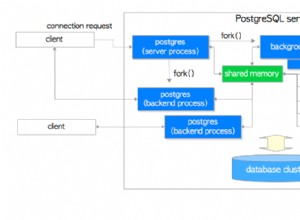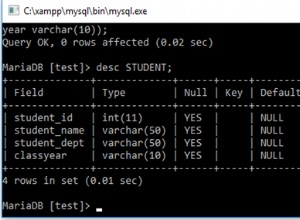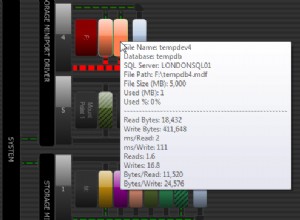En la parte superior de su archivo .vb:
Imports System.data.sqlclient
Dentro de su código:
'Setup SQL Command
Dim CMD as new sqlCommand("StoredProcedureName")
CMD.parameters("@Parameter1", sqlDBType.Int).value = Param_1_value
Dim connection As New SqlConnection(connectionString)
CMD.Connection = connection
CMD.CommandType = CommandType.StoredProcedure
Dim adapter As New SqlDataAdapter(CMD)
adapter.SelectCommand.CommandTimeout = 300
'Fill the dataset
Dim DS as DataSet
adapter.Fill(ds)
connection.Close()
'Now, read through your data:
For Each DR as DataRow in DS.Tables(0).rows
Msgbox("The value in Column ""ColumnName1"": " & cstr(DR("ColumnName1")))
next
Ahora que los conceptos básicos están fuera del camino,
Recomiendo abstraer la ejecución real de SqlCommand en una función.
Aquí hay una función genérica que uso, de alguna forma, en varios proyectos:
''' <summary>Executes a SqlCommand on the Main DB Connection. Usage: Dim ds As DataSet = ExecuteCMD(CMD)</summary>'''
''' <param name="CMD">The command type will be determined based upon whether or not the commandText has a space in it. If it has a space, it is a Text command ("select ... from .."),'''
''' otherwise if there is just one token, it's a stored procedure command</param>''''
Function ExecuteCMD(ByRef CMD As SqlCommand) As DataSet
Dim connectionString As String = ConfigurationManager.ConnectionStrings("main").ConnectionString
Dim ds As New DataSet()
Try
Dim connection As New SqlConnection(connectionString)
CMD.Connection = connection
'Assume that it's a stored procedure command type if there is no space in the command text. Example: "sp_Select_Customer" vs. "select * from Customers"
If CMD.CommandText.Contains(" ") Then
CMD.CommandType = CommandType.Text
Else
CMD.CommandType = CommandType.StoredProcedure
End If
Dim adapter As New SqlDataAdapter(CMD)
adapter.SelectCommand.CommandTimeout = 300
'fill the dataset
adapter.Fill(ds)
connection.Close()
Catch ex As Exception
' The connection failed. Display an error message.
Throw New Exception("Database Error: " & ex.Message)
End Try
Return ds
End Function
Una vez que tenga eso, su ejecución de SQL + código de lectura es muy simple:
'----------------------------------------------------------------------'
Dim CMD As New SqlCommand("GetProductName")
CMD.Parameters.Add("@productID", SqlDbType.Int).Value = ProductID
Dim DR As DataRow = ExecuteCMD(CMD).Tables(0).Rows(0)
MsgBox("Product Name: " & cstr(DR(0)))
'----------------------------------------------------------------------'




